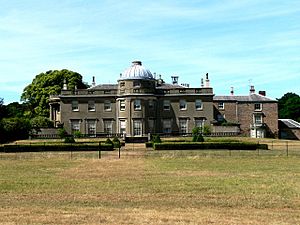Sir William St Quintin, 3rd Baronet facts for kids
Sir William St Quintin, 3rd Baronet (born around 1662 – died June 30, 1723) was an important English politician and businessman from Harpham, Yorkshire. He was a member of the House of Commons, which is like a part of today's Parliament, from 1695 until he died in 1723. Sir William held many important jobs in the government during his life.
Contents
Early Life and Family History
Sir William St Quintin was the oldest son of William St Quintin and Elizabeth Strickland. His family was well-known in Yorkshire. His grandfather, Sir Henry St. Quintin, 2nd Baronet, was also a Baronet. A Baronet is a special title, like a knight, that can be passed down in a family.
Sir William's father passed away in 1695. Just a few days later, his grandfather also died. This meant that Sir William became the 3rd Baronet in November 1695. In the 1690s, he bought a large piece of land and a house called Scampston Hall near Malton, North Yorkshire. This beautiful estate became the main home for his family.
A Career in Government and Business
The St Quintin family was a leading merchant family in Hull, a big port city. Sir William was very active in the city's government. In 1689, he was the Chamberlain of Hull, which was an important financial role.
Becoming a Member of Parliament
In 1695, Sir William was elected to the House of Commons as the Member of Parliament for Kingston upon Hull. This meant he represented the people of Hull in the national government. He served as their MP for many years, in eleven different Parliaments!
Important Government Jobs
Sir William was a very skilled official. He held many important and well-paying jobs in the government:
- From 1698 to 1701, he was a Commissioner of Customs. This job involved managing taxes on goods coming into the country. It paid a lot of money, £1000 a year, which was a huge amount back then! He had to leave this job when a new rule said that Commissioners could not also be Members of Parliament.
- In 1700, he became the Mayor of Hull.
- From 1706 to 1713, he worked as a Commissioner of Revenue in Ireland, doing similar work to the Customs job.
- In 1711, he helped manage investments in the South Sea Company, a big trading company.
- From 1714 to 1717, he was a Lord of the Treasury. This meant he helped manage the country's money.
Later Public Service
Sir William became Mayor of Hull again in 1715. In 1717, he took on another role in the Alienation Office. In 1720, he was given a very important job as joint Vice-Treasurer, Receiver General, and Paymaster of Ireland. He held these jobs until he passed away. He was also a member of the Privy Council of Ireland, which was a group of important advisors to the King in Ireland.
His Legacy
Sir William St Quintin never married. He died on June 30, 1723. His nephew, also named William, became the next Baronet. Sir William was buried at St. John of Beverley Church in Harpham.
 | John T. Biggers |
 | Thomas Blackshear |
 | Mark Bradford |
 | Beverly Buchanan |


